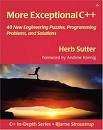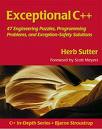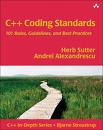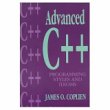Olivier Langlois's blog
Category: C++
07/31/07
More Exceptional C++
Mr. Sutter's books biggest strength to my opinion is that they bring together a bunch of original advanced C++ topics that you cannot find anywhere else. This book has its share of very original content but I feel like the ratio original content vs topics that you can find in other books is lower in this book than with the other books of the serie. The most interesting section in this book in my opinion is the one on exception safety and the less original section is the one on generic programming and STL as you can find much of the information contained in this section in other books such as Effective STL from Scott Meyer or C++ Template from David Vandervoorde and Nicolai M. Josuttis.
07/30/07
Exceptional C++: 47 Engineering Puzzles, Programming Problems, and Solutions
This book presents advices more or less in the same format than books from the Effective C++ serie. What is similar is that topics are divided in 47 small items of few pages each. The difference is that the author first ask questions to the readers or propose exercises and encourage the reader to put down the book and to take the time to think about the problem and then come back to read his answer. This format is more or less original as I have seen something similar in Tom Cargill's C++ Programming Style book.
I have read this book pretty fast which is a good sign of my interest in a book but in the same time this book did not leave me, at first, a strong impression that will make me remember this reading for a long time. It is hard for me to say exactly why but I think that it is because most items focus on very small details of C++. Some of these problems are very hard and probably is an indication that the book targeted audience is advanced C++ users which is not a bad thing by itself but I was not convinced that mastering these small details actually has a high impact on someone programming skills.
It took few months to let the wisdom contained in this book to sink in and I have found myself many times, in my day to day programming, confronted to problems where the material of this book helped to make wise design decisions. So now, I think that this book is very valuable for anyone that has mastered the C++ programming language and is ready to master tougher C++ issues.
07/25/07
C++ Coding Standards: 101 Rules, Guidelines, and Best Practices
I had high expectations about the fruit of the association of 2 authors that I appreciate but the result did not meet these expectations. Basically this book provides 101 rules or guidelines that you can get for free by looking at the table of content. Each of these rules is then followed by a very short explanation (1 or 2 pages usually). In my opinion, most of them are common wisdom that you can get from other sources. This is it. That is all you will get from this book. For that reason, I recommend to skip this one except if a convenient and compact collection of common knowledge is something that you are looking for.
07/17/07
C++ Strategies and Tactics
You have to know that its target audience is beginner C++ programmers. I am somehow experienced with C++ programming and by looking at the excellent reviews this book got, I had high expectations when I purchased it. I have been disappointed to only have found maybe 2 small advices that I did not know. Reading over 250 pages for a so small reward has been disappointing. If you consider yourself good in C++, my advice is that you should skip this one.
07/16/07
Advanced C++ Programming Styles and Idioms
I have read this book because it was recommended by Scott Meyer in his book More Effective C++: 35 New Ways to Improve Your Programs and Designs and he was saying that this book was showing what C++ looked like on LSD. This book certainly contains interesting ideas and it demonstrate that the author has an exceptional creativity as a C++ user but Mr. Coplien best quality is not teaching in my opinion. To me, the text is opaque and hard to understand when the author is using terms such as "orthodox canonical form".
Olivier Langlois's blog
I want you to find in this blog informations about C++ programming that I had a hard time to find in the first place on the web.
| Sun | Mon | Tue | Wed | Thu | Fri | Sat |
|---|---|---|---|---|---|---|
| << < | > >> | |||||
| 1 | 2 | 3 | 4 | 5 | ||
| 6 | 7 | 8 | 9 | 10 | 11 | 12 |
| 13 | 14 | 15 | 16 | 17 | 18 | 19 |
| 20 | 21 | 22 | 23 | 24 | 25 | 26 |
| 27 | 28 | 29 | 30 | 31 | ||
Search

Categories
Olivier Langlois's blog
- AAC (2)
- Book reviews (12)
- C++ (24)
- Code Optimization (4)
- Compiler (3)
- Fractal (2)
- Linux/UNIX (3)
- Multithreading (3)
- Software security (7)
- TCP/IP (8)
- Web (1)
- Windows programming (19)
- C++ (28)
- tutorials (4)
- General (10)
- Hardware reviews (2)
- Linux (12)
- Recommended books (4)
- C++ (20)
- Code Optimization (2)
- Compiler (3)
- Fractal (2)
- Linux/UNIX (1)
- Multithreading (2)
- Rare out of print (3)
- Software security (5)
- TCP/IP (7)
- Windows programming (16)
- Software reviews (0)
- TCP/IP (8)
- Video games (4)
Archives
- January 2016 (1)
- September 2015 (1)
- July 2015 (1)
- June 2015 (1)
- May 2015 (1)
- December 2013 (3)
- September 2013 (1)
- May 2013 (8)
- April 2013 (1)
- December 2010 (1)
- August 2010 (1)
- June 2010 (1)
- More...
Misc
 XML Feeds
XML Feeds
What is RSS?
Who's Online?
- Guest Users: 4
 BOOKS i'm reading
BOOKS i'm reading








